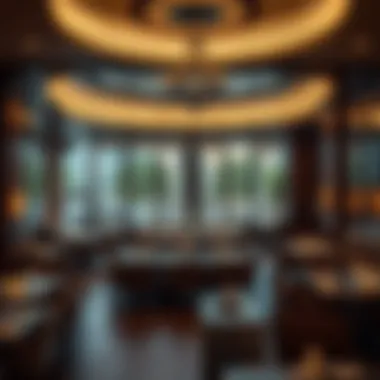Navigating the Restaurant Market in Dubai


Intro
The vibrant culinary scene in Dubai has become a beacon for investors looking to dive into the restaurant market. With a blend of luxurious dining experiences and casual homegrown eateries, the city provides a myriad of opportunities for those ready to take the plunge. Understanding this dynamic market can position potential buyers to not just make savvy investments but to thrive in an environment rich with diversity.
As we explore the nuances of acquiring restaurants in Dubai, various elements come into play, including market trends, types of dining establishments, and essential legal frameworks. This is not merely about finding a location or a property; it’s about grasping the full scope of what owning a restaurant in Dubai entails.
Investors, homeowners, agents, developers, and expatriates all share a common ambition in this competitive landscape—turning a passion for food into a lucrative enterprise. With that in mind, let’s turn our attention to the specific market insights that can guide this journey.
Understanding the Dubai Restaurant Market
The restaurant market in Dubai has grown exponentially in recent years, making it a focal point for investors, entrepreneurs, and culinary enthusiasts alike. This rapid growth not only reflects the city's diverse population but also shines a light on its evolving culinary landscape that constantly adapts to meet both local and tourist preferences. For anyone considering entering this vibrant market, understanding its nuances is paramount.
First and foremost, recognizing current dining trends offers significant advantages to prospective buyers. Different demographics, from expatriates to tourists, bring unique tastes and expectations, driving the evolution of cuisines available. Thus, knowing what’s hot—from food concepts to service styles—can make or break a restaurant’s success. For instance, sustainability is becoming a key focus as consumers become more environmentally conscious. This shift indicates a ripe opportunity for restaurants that embrace local sourcing and eco-friendly practices.
In addition, market analysis reveals a wealth of growth opportunities. Dubai's strategic location as a global hub, coupled with its thriving tourism sector, means that the potential for profit is substantial. Whether focusing on quick bites in tourist-heavy areas or upscale dining experiences that cater to affluent residents, the prospects are as diverse as the eateries themselves. Investors can find a niche that aligns with their interests and capital, thus tapping into a segment where demand outstrips supply.
Also, diving into the financial aspects of the market can illuminate the importance of understanding operational costs and expected profit margins. It's crucial for buyers to comprehend the financial landscape before making any commitments, ensuring they can navigate expenses related to rent, staffing, and procurement effectively. Furthermore, familiarizing oneself with the regional business environment and economic conditions can provide the insight needed to make informed decisions.
In summary, appreciating the intricacies of the Dubai restaurant market isn't just beneficial; it's essential for success. Understanding trends, spotting growth potential, and grasping financial dynamics equip investors with the tools required to thrive in this competitive environment. With opportunity lurking around every culinary corner, preparing oneself through knowledge and strategy can pave the way to fruitful ventures.
"In the realm of gastronomy, knowledge truly serves as the first ingredient for success."
Keywords:
Dubai restaurant market, current trends, growth opportunities, market analysis, financial aspects, culinary landscape.
Types of Restaurants Available for Sale
When it comes to buying a restaurant in Dubai, understanding the different types of establishments available is crucial. This categorization not only helps potential investors to determine where they want to focus their efforts but also highlights the unique advantages and challenges inherent to each type of restaurant. Factors such as consumer demand, target audience, operational needs, and financial viability play key roles in shaping decisions for buyers. Whether you are a seasoned restaurateur or a first-time buyer, knowing the lay of the land—with its diverse options—can guide your investment strategy effectively.
Fine Dining Establishments
Fine dining establishments represent the pinnacle of culinary craftsmanship and customer service. These venues typically offer an upscale menu with high-quality ingredients, elaborate presentations, and an exceptional dining experience. They cater to a clientele that is often willing to pay a premium for both the food and the ambiance. Buying a fine dining restaurant in Dubai can be a lucrative investment, especially with the influx of tourists and affluent residents seeking culinary adventures.
However, venturing into this niche requires a robust understanding of the market, as the operational costs are significantly higher compared to other types. Factors to consider include:
- Location: Prime spots in affluent areas can enhance visibility and attract a wealthier clientele.
- Staffing: High-caliber chefs and trained waitstaff are vital to maintaining the quality expected in fine dining.
- Marketing: Unique promotional strategies are essential for sustaining interest in a highly competitive sector.
Casual Dining Venues
Casual dining venues strike a balance between quality and affordability, making them popular among a wider audience. These restaurants typically offer a relaxed atmosphere, accompanied by a diverse menu that ranges from comfort food to international cuisines. Investors may find entering this segment appealing due to the broad market appeal and moderate investment thresholds.
When looking at casual dining options, some vital considerations include:
- Customer Base: Accessibility is key; understanding the demographic trends in your chosen location can lead to better customer retention.
- Menu Flexibility: Regular updates and seasonal menus can keep the dining experience fresh and engaging.
- Cost Management: Being savvy about inventory and staffing can enhance profit margins with less effort compared to fine dining.
Fast Food Outlets
The fast food sector has seen an explosion of growth in Dubai, fueled by a bustling city lifestyle that demands quick and affordable dining solutions. This category includes both franchise and independent outlets that cater to local and expatriate populations alike. Fast food restaurants often thrive on volume, which means that the right location and effective marketing strategies can quickly lead to profitability.
Key points to evaluate include:
- Franchise Opportunities: Many buyers prefer established brands for their marketing power and operational support, but they come with fees and ongoing royalties.
- Location Strategy: High foot traffic areas, such as malls or busy streets, are ideal for fast food outlets.
- Consumer Trends: Staying abreast of shifts in dietary preferences, such as plant-based offerings, can provide additional competitive advantages.
Cafés and Bakeries
Cafés and bakeries add a unique flavor to Dubai's culinary landscape, often serving as social hubs for various communities. These establishments can range from artisanal bakeries to modern coffee shops, with many blending both food and beverage services. Investing in cafés or bakeries can offer various benefits, particularly given the growing coffee culture in the city.


Important aspects to focus on include:
- Quality of Products: Artisanal goods or unique brewing techniques can differentiate a café from others in a saturated market.
- Customer Engagement: Creating inviting atmospheres encourages customers to linger, increasing their likelihood of return visits.
- Seasonal Menus: Adapting offerings to seasonal ingredients or unique flavors can keep the business fresh and appealing.
"The key to success in choosing the right type of restaurant lies in aligning your investment with market demand and your personal strengths as a restaurateur."
In summary, understanding the types of restaurants available for sale in Dubai is not just about identifying what exists; it is about strategically choosing the right fit for your investment ambitions and operational capabilities. Each type carries its own set of challenges and rewards, making it essential for potential buyers to engage deeply with their chosen category.
Key Factors to Consider When Buying a Restaurant
When stepping into the bustling gastronomical realm of Dubai, potential restaurant buyers must consider several pivotal factors before diving in headfirst. Simply put, it's not just about finding a lovable little eatery; it’s about securing a venture that will flourish in this highly competitive environment. From location to financial health, every element plays a fundamental role in the success of the acquisition. Here’s a breakdown:
Location and Customer Demographics
The age-old adage "Location, location, location" rings ever true in the restaurant business. The ideal site can make or break your establishment. In Dubai, areas such as Jumeirah, Dubai Marina, and Downtown are prime spots, attracting both tourists and expats.
- Foot Traffic: An area with high foot traffic ensures a steady stream of potential customers. Selecting a restaurant near popular tourist attractions or busy shopping centers can significantly enhance visibility.
- Local Culture: Knowing the customer demographics is just as crucial. If you're considering a fine dining German restaurant amidst a predominantly Asian demographic, you may face an uphill battle. Having knowledge about the local population's dining habits, preferences, and economic capability will help tailor the offering.
- Accessibility: A location that is easy to find and reach will certainly attract more guests. Check for adequate parking spaces, proximity to public transportation, and ease of access from main roads.
The synergy of these factors can create a seamless dining experience that keeps customers coming back for more.
Financial Health and Profit Margins
Diving into financials might feel like swimming with sharks, but it’s absolutely necessary. A thorough understanding of the financial health of any restaurant prior to purchase gives buyers a glance at what they are stepping into.
- Historical Financial Statements: Evaluating profit and loss statements, balance sheets, and cash flow statements from the last few years provides valuable insight into trends and fluctuations.
- Hidden Costs: Restaurant operations can be harbingers of unexpected costs—think maintenance, utilities, and staff wages. Buyers should account for these when assessing profitability. Ignorance here can lead to nasty financial surprises down the road.
- Profit Margins: Know the average profit margins in the restaurant industry—typically around 3% to 5% for fast casual and higher for fine dining. Understanding these numbers aids in contextualizing the restaurant’s value.
"A dollar saved is a dollar earned.” Knowing your financials means more than just counting coins; it’s about building a robust roadmap for future success.
Operational Requirements and Staffing
Understanding operational dynamics is like learning the rhythm of a new song; it takes practice but is crucial. How a restaurant runs on a daily basis can deeply impact its bottom line.
- Staffing Needs: Assess staffing needs and retention rates. High turnover can indicate deeper issues within the operation. Knowledge of the local labor market is instrumental in ensuring that you can find hospitality professionals who meet your standards.
- Supplier Contracts: Existing contracts with suppliers can affect margins. Are they favorable for the type of cuisine you intend to serve? Understanding the supply chain will help determine whether you can maintain consistent quality at a competitive cost.
- Operational Infrastructure: Familiarize yourself with the kitchen layout, equipment, and menu. An efficient work environment and a sound menu can lead to enhanced productivity and customer satisfaction.
By focusing on these operational aspects, potential buyers pave the way for making a well-informed purchase that aligns with their vision.
Navigating the Legal Landscape
When one thinks about investing in restaurants in Dubai, the first thought might not be the legal landscape. Yet, understanding the nuances of law surrounding restaurant ownership is crucial. The legal framework doesn't just protect your investment; it ensures the operation flows smoothly within local governance structures. Navigating this landscape can feel like walking through a maze, with various regulations about licensing, health, and safety that newcomers might overlook.
Getting a handle on these aspects can spell the difference between a flourishing business and a costly shutdown. One misstep in understanding the legal requirements can derail the rest of your plans. Thus, delving deep into licensing and permits and ensuring compliance with health regulations is non-negotiable for anyone keen on success in Dubai's vibrant restaurant sector.
Understanding Licensing and Permits
To kick things off, licensing is akin to earning your stripes in the culinary scene of Dubai. Essentially, there are a few types of permits that one needs to get their hands on before even considering a plate of food on a table.
- Food Establishment Permit: This is your golden ticket; without it, you aren’t getting anywhere. It's issued by the municipality and ensures the business can operate legally.
- Trade License: Issued by the Department of Economic Development, this license is crucial for any business, including restaurants, as it grants permission to trade.
- Liquor License: If cocktails are on the menu, a liquor license becomes mandatory. This isn’t a simple endeavor, as it's tightly regulated, mainly focused on ensuring responsible management of alcohol sales.
Each permit has its own set of requirements, often requiring documents that demonstrate financial capability, a well-laid-out business plan, and sometimes even an inspection of the premises. Expect a wait time as well; acquiring all necessary permits isn’t a matter of a few days. Engaging a local consultant who knows the ropes isn’t just a suggestion; it can save significant time and frustration.
Compliance with Health and Safety Regulations
Moving on, compliance with health and safety regulations is not just red tape. It serves to ensure that patrons enjoy safe and hygienic dining experiences. The standards in Dubai are stringent, and for good reason. With the diverse food landscape, the last thing you want is a breach that could affect public health and escalates into something serious.
Key points to remember:
- Food Handling Guidelines: Restaurants must adhere to specific food handling and storage guidelines, ensuring that dishes are prepared in a clean environment.
- Employee Health Check: Staff should pass health screenings, which is particularly relevant in any domain where food safety is vital.
- Hygiene Inspections: Regular inspections will be conducted by health authorities to ensure compliance, and failing one can result in hefty fines or closing the establishment altogether.


Understanding the legal landscape is essential for sustained success and compliance in the restaurant industry.
For those seeking more on the subject, check relevant government regulations and guidelines available at Dubai Municipality and the Department of Economic Development.
Engaging a legal expert familiar with the Dubai regulatory framework can also streamline the process, ensuring your focus remains on creating a remarkable dining experience.
Financial Considerations for Buyers
When diving into the Dubai restaurant market, a solid grasp of financial considerations is crucial for any prospective buyer. This segment of the article emphasizes the intricacies and stakes involved in acquiring a restaurant, underpinning how astute financial management can pave the way for long-term success. Not only does understanding finances inform decision-making, but it also sets realistic expectations about required investments and potential returns. A restaurant is more than just a business; it represents an investment in a vibrant culture; thus, knowing when to dive in and when to hold back can make a world of difference.
Evaluating Financial Statements
One of the first steps in assessing any restaurant for sale is a meticulous evaluation of financial statements. Here, buyers should look closely at several key documents:
- Profit and Loss Statements: This reveals the restaurant’s ability to generate profit over time. A consistent upward trend speaks volumes.
- Balance Sheets: These highlight assets versus liabilities, providing crucial insight into the restaurant's financial health.
- Cash Flow Statements: Inspecting cash flows will shed light on operational efficiency; negative cash flow can be a red flag.
The devil's in the details; small discrepancies can indicate larger issues lurking beneath. For a savvy investor, this means potential pitfalls can be avoided or negotiated down before any commitments are made.
Cost of Acquisition vs. Potential Returns
Determining the cost of acquisition against potential returns is like comparing apples to oranges. It’s essential to scrutinize what you are paying for and what you stand to gain. A few elements to consider include:
- Initial Investment: This encompasses the acquisition price along with initial renovations or upgrades.
- Operational Costs: One must consider ongoing expenses such as rent, staffing, and utility bills, which can eat into profitability.
- Market Potential: A restaurant in a high footfall area may yield higher returns, while one in a more obscure setting might struggle.
"A wise investor understands that every penny counts when weighing costs against anticipated profits."
Calculating returns isn’t a straightforward formula; it requires understanding market dynamics and consumer preferences along with precise forecasting. With the right information, buyers can make informed decisions that align with their financial goals.
Financing Options Available
Many buyers may need to secure financing to enter this competitive market. Fortunately, there are various financial avenues to explore:
- Traditional Bank Loans: These usually offer competitive interest rates but require solid credit history and a clear business plan.
- Private Investors or Venture Capital: Attracting private investors can provide quicker access to capital, though it typically involves giving up some control.
- Government Grants and Incentives: In the UAE, various programs are designed to support entrepreneurs, offering favorable financing conditions.
- Leasing Equipment: Instead of buying kitchen equipment outright, leasing can significantly reduce upfront costs, freeing cash for other uses.
Navigating through financing options requires strategic thinking. Careful consideration of terms, repayment conditions, and how they tie back to the projected profitability of the restaurant is key to ensuring that financial management is sound from the start.
Understanding these aspects of financial considerations not only equips the buyer with necessary knowledge but also instills confidence when making one of life's more significant investments.
Success Stories and Case Studies
Examining successful restaurant ventures offers a treasure trove of insights for investors considering the Dubai market. Understanding these success stories can illuminate the path to achieving goals in this bustling culinary landscape. These case studies not only showcase what works but also highlight potential pitfalls that new restaurant owners could face. As one navigates through acquiring a restaurant, these success tales can serve as a guiding star, anchoring decisions in proven strategies and innovative concepts.
Successful Restaurant Turnarounds
Turnarounds in the restaurant sector can often seem like they belong to a scriptwriter's imagination. However, in reality, they reflect the gritty determination and creativity of restaurateurs who refused to throw in the towel. Take, for instance, Bistro 1, which had nearly closed its doors due to declining sales. After a detailed analysis of customer feedback, management decided to reinvent both the menu and the ambiance. By introducing locally sourced ingredients and creating an inviting atmosphere, they shifted their branding from a regular dining spot to a culinary destination. Within months, the restaurant not only regained former patrons but also attracted newcomers seeking unique dining experiences.
Not just a menu change, but a complete brand overhaul saved Bistro 1 from extinction.
Such examples underscore that success often stems from the willingness to adapt. Buyers should consider the stories of these turnarounds as a reminder that with the right adjustments, even struggling establishments can experience new life. They demonstrate the importance of understanding local tastes, leveraging strategic marketing, and instilling a fresh vision that aligns with customer expectations.
Innovative Concepts That Succeeded
Innovation remains at the heart of the restaurant business, especially in Dubai, a melting pot of cultures and culinary traditions. Consider the case of Street Food by the Bay. This concept was born out of the recognition that many residents craved authentic street food experiences reminiscent of their home countries. By gathering popular local vendors and immigrant chefs under one roof, they created an eclectic gastronomic hub that not only reflects the rich cultural fabric of Dubai but also attracts a diverse clientele.
The restaurant's success lies not just in food but also in the atmosphere—complete with live cooking stations and vibrant music. This venture demonstrates how honoring culinary diversity can lead to remarkable achievements in the market. New investors should take note: it is often the avant-garde concepts that resonate well with an increasingly sophisticated customer base.
Cultural and Culinary Influences
Navigating the restaurant market in Dubai means recognizing the intricate interplay of cultural and culinary influences that shape consumer preferences. The unique blend of traditions, lifestyles, and gastronomies in this cosmopolitan city provides a fertile ground for diverse dining experiences. Understanding these nuances is vital for investors looking to take advantage of a continually evolving marketplace.


Diversity in Cuisine: An Advantage
Dubai boasts a melting pot of cultures, each bringing its own flavors and culinary traditions to the table. This diversity is not just an aesthetic; it is a strategic advantage for restaurant owners in this vibrant city. By embracing multiple cuisines from around the globe, restaurateurs can appeal to a wider audience, thus enhancing their market reach.
- Global Appeal: Consumers in Dubai delight in exploring various culinary offerings. An eatery that offers a mix of Middle Eastern, Indian, Chinese, and Italian dishes can attract both local patrons and expats. This strategy enables restaurants to stand out among the competition.
- Seasonality and Festivals: Cultural events and festivals provide a chance for restaurants to innovate their menus. For instance, special dishes during Ramadan or Diwali can draw significant interest and establish loyal customer bases.
- Collaborative Ventures: Diverse culinary backgrounds can lead to unique fusions that captivate gourmet audiences. Restaurants that blend different cuisines often create trending dishes that attract food enthusiasts and savvy investors alike.
"Embracing diversity isn’t just a strategy; it’s the essence of the Dubai dining scene. The more varied the menu, the higher the chances for success."
Adapting to Local Tastes and Preferences
While offering global flavors is crucial, adapting to local tastes is equally significant. In a multicultural hub like Dubai, there's a demand for authenticity as well as innovation. Here are a few considerations:
- Understanding Local Palates: It helps to conduct surveys or focus groups with local consumers to get insights into their dining preferences. For example, recognizing that certain spices are preferred can guide the creation of enticing menu items.
- Ingredient Sourcing: Utilizing locally sourced ingredients not only helps to reduce costs but also supports local economies. This can resonate with environmentally conscious customers who value sustainability.
- Cultural Etiquette: Respecting cultural norms is paramount. For example, ensuring that menus are reflective of Islamic dietary laws, such as serving halal meat, is crucial for capturing the local customer segment.
Adapting to both diverse and local influences lays a solid foundation for success. Investors and restaurateurs who remain attuned to these cultural and culinary currents are better positioned to capture the hearts—and appetites—of Dubai’s dynamic populace.
The Role of Technology in Restaurant Operations
In the modern landscape of the restaurant business, technology is not just a luxury; it’s a necessity. For anyone planning to buy a restaurant in Dubai, understanding how technology can enhance operations is crucial. The integration of technological solutions can streamline processes, improve customer experience, and, ultimately, boost profitability. Especially in a city like Dubai, known for its competitive dining scene, leveraging the right tools can set a restaurant apart from the crowd.
Utilizing Technology for Efficient Management
Efficient restaurant management often hinges on the adoption of various technological solutions. This includes everything from inventory management software to sophisticated point-of-sale (POS) systems. Implementing these systems helps owners keep track of food costs, monitor stock levels, and reduce waste. With smart inventory solutions, restaurant owners can gain insights into their supply chain, allowing for better purchasing decisions based on real-time data.
Moreover, customer relationship management (CRM) tools can be pivotal. By tracking customer preferences and feedback, a restaurant can personalize its services—leading to improved customer satisfaction.
- Inventory Management Systems: Reduces waste by keeping tabs on stock levels and usage patterns.
- Point-of-Sale Systems: Streamlines transactions while providing detailed sales reports and analytics.
- Staff Scheduling Tools: Facilitates efficient staff turnover and optimized labor costs.
Across various facets of restaurant management, technology not only enhances efficiency but also fosters a culture of accountability. When staff is equipped with the right tools, it’s easier to meet customer expectations and maintain high service standards.
Digital Marketing Strategies for Restaurants
In today’s digital-first world, any discussion about restaurant operations is incomplete without touching on marketing strategies driven by technology. Establishing a strong online presence through various platforms is paramount for restaurants in Dubai. With a diverse and bustling local and tourist population, being visible online can mean the difference between a packed dining room or an empty one.
Utilizing social media platforms like Instagram and Facebook allows restaurants to showcase their unique offerings and ambiance through striking visuals. Happy hour photos, signature dishes, and special events can attract attention and drive engagement. Additionally, running targeted ad campaigns on these platforms can effectively reach potential customers.
- Search Engine Optimization (SEO): Using keywords strategically, such as "restaurants in Dubai" or "fine dining in Dubai," can enhance a restaurant’s visibility in search results.
- Email Marketing: Sending out newsletters with updates about new menu items, events, or promotions keeps customers in the loop and entices them to visit.
- Online Reservation Systems: Implementing easy-to-use reservation tools ensures that guests can secure a table without hassle, contributing to a positive customer experience.
"In the restaurant industry, effective technology utilization transforms operations from mere survival to thriving in a highly competitive environment."
Market Forecast and Future Developments
In the ever-evolving landscape of Dubai's restaurant market, understanding the forecast and future developments is crucial for those looking to invest. With a dynamic environment moving swiftly from traditional dining concepts to innovative culinary experiences, buyers should be keenly aware of these shifts. Knowledge of market trends helps investors to align their strategies effectively, ensuring that their ventures not only survive but thrive in the competitive Dubai dining scene.
Considering the factors driving change will provide foresight into potential opportunities and pitfalls. As the saying goes, "A stitch in time saves nine." Being informed about future developments allows potential buyers to make proactive decisions, positioning themselves advantageously amid the flux of market behaviors.
Predicted Trends in Dining and Consumer Behavior
The trends surrounding dining and consumer habits in Dubai are showing noteworthy trajectories. Initially, the emphasis on health and wellness, driven by the pandemic aftermath, highlights a rising demand for nutritious meal options. Diners are increasingly gravitating towards eateries that source local ingredients and offer organic choices. In fact, many restaurants are now crafting menus that resonate with health-conscious consumers, sparking interest in vegan or gluten-free offerings. This is more than just a trend; it's becoming a pivotal expectation for many.
Moreover, personalization is becoming a significant factor in consumer decision-making. Diners now seek unique experiences rather than mere meals. Restaurants that offer customizable dishes or interactive dining experiences—think cooking classes or chef's tasting menus—stand to benefit immensely. The desire for memorable engagements or Instagrammable moments plasters a vivid layer over the dining experience.
"Crowd-pleasers are fine, but everyone is wading through the waters looking for something unique." - Anonymous Chef
As global tastes continue to weave into the local fabric, fusion cuisine is also rapidly gaining traction. Restaurants blending Western culinary styles with traditional Emirati flavors provide exciting new experiences, sparking curiosity and drawing diverse clientele. This artistic blending of influences not only reflects cultural richness but also expands the market potential for investors.
Anticipated Regulations and Market Changes
Looking ahead, potential restaurant buyers should keep a watchful eye on anticipated regulations and market changes that may impact their investments. For instance, the Dubai government's push towards sustainable practices means stricter regulations on waste management and energy consumption can be expected. This opens avenues for establishments that prioritize sustainability, but also challenges traditional operations that are less adaptable.
Furthermore, shifts in licensing requirements are probable. Recent efforts towards easing business setup processes will benefit prospective restaurateurs, possibly leading to an influx of new dining concepts. However, potential buyers must stay updated with the legal framework to navigate through potential hurdles efficiently.
Regulatory changes can directly influence the market landscape—altering competition levels, operational strategies, and even customer bases. Keeping abreast of these developments allows investors to forecast risks and adapt their business models accordingly.
In summary, having a finger on the pulse of forecasted changes empowers prospective buyers to plan for the future skillfully. The confluence of trends in consumer behavior and regulatory movements signifies that those who stay informed will be best positioned to capitalize on Dubai's vibrant restaurant market.







